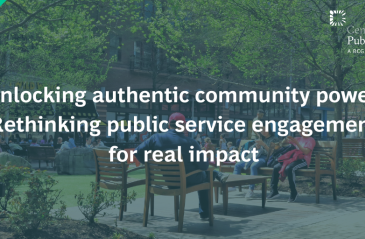
The power of storytelling in climate leadership

São Paulo is the grand prize winner of the 2016 Bloomberg Philanthropies Mayors Challenge
Share articleSão Paulo will receive $5 million to connect local farmers to the city's restaurants and markets
Share articlePrizes also were awarded to the cities of Bogotá, Guadalajara, Medellín and Santiago
Share articleWe put our vision for government into practice through learning partner projects that align with our values and help reimagine government so that it works for everyone.
The city of São Paulo is many things. Home to more than 20 million people - myself included - it is sprawling and diverse, the largest city in South America and, in addition, the grand prize winner of the 2016 Bloomberg Philanthropies Mayors Challenge competition.
Its selection capped a year of activity across Latin America and The Caribbean, a year which saw hundreds of cities from across the region enter the contest to generate innovative ideas that can address urban challenges and improve city life - and have the potential to spread. The Centre for Public Impact has been working as the competition's implementation partner, helping ensure that all those shortlisted can benefit from the experience by learning about how to develop new ideas, what can work and by making new connections. So, how did it go?
Previous Mayors Challenge competitions had taken place in the United States and Europe, but with 80% of Latin America's population now living in cities it was clear that we had a broad canvas upon which to work. We were delighted that 290 cities representing 19 countries across the region entered the contest.
From this wide array, 20 finalists emerged and over a four month period they participated in a robust programme of support to stretch strengthen and refine their proposals. During this time they attended Ideas Camp, a two-day intensive workshop in Bogota, Colombia, where they worked with leading innovation experts and peer cities to further refine their ideas. Five cities emerged as winners based on four criteria: their idea's vision and creativity, potential for impact, transferability, and viability of implementation.
São Paulo's victory will see it receive $5 million to implement its proposal to connect struggling local farmers on the outskirts of the city to vibrant city markets and restaurants in need of organic products. Under the plans, the city will promote sustainable land use and job opportunities by creating a digital farm-to-table exchange platform.
The platform will connect local farmers on the far edges of the city to the growing number of restaurants, markets, and institutions in need of locally grown produce. Already well renowned for its foodie scene, the proposal will further São Paulo's dining sector, as well as enable inclusive development in the urban fringes and, over time, generate land value through sustainable use and protection of water reservoir areas.
Prizes also were awarded to Bogotá, Colombia for rethinking the school commute for children; Guadalajara, Mexico for tackling corruption in permitting and land use; Medellín, Colombia for combating illegal lending and promoting financial inclusion; and Santiago, Chile for its community based approach to reducing childhood obesity. Each of these four cities will receive $1 million and robust implementation support to bring their proposals to life.
The scale and originality of the proposals prompted Michael R. Bloomberg, founder of Bloomberg Philanthropies and three-term Mayor of New York City, to comment: "The variety and ingenuity of the five winning ideas highlights the innovation happening in Latin American and Caribbean cities. If these ambitious ideas take root, they have the potential to improve lives across the region and serve as a model for other cities around the world."
The 2016 winners represent a strong mix of geographies and important issues for the region. They also share key themes: the sophisticated use of technology and data to enable greater impact; the prioritisation of citizens' needs and experiences; and a reliance on partnerships to enhance local commitment and sustainability.
Together, these bold ideas and proposed solutions reflect complex challenges facing cities in the Latin American and Caribbean region and beyond. It's now down to all of us turn ideas into impact - let's get to work.











